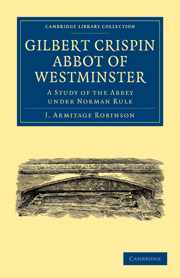Book contents
- Frontmatter
- PREFACE
- Contents
- I GILBERT'S HOME AT BEC
- II THE NOBLE FAMILY OF THE CRISPINS
- III GILBERT AT WESTMINSTER
- IV DETAILS OF ADMINISTRATION
- V ABBOT GILBERT'S LITERARY REMAINS
- VI CORRESPONDENCE
- VITA DOMNI HERLUINI ABBATIS BECCENSIS
- LIBER DE SIMONIACIS
- SELECTED CHARTERS
- ADDITIONAL NOTES
- INDEX
- NOTES AND DOCUMENTS RELATING TO WESTMINSTER ABBEY
V - ABBOT GILBERT'S LITERARY REMAINS
Published online by Cambridge University Press: 07 September 2011
- Frontmatter
- PREFACE
- Contents
- I GILBERT'S HOME AT BEC
- II THE NOBLE FAMILY OF THE CRISPINS
- III GILBERT AT WESTMINSTER
- IV DETAILS OF ADMINISTRATION
- V ABBOT GILBERT'S LITERARY REMAINS
- VI CORRESPONDENCE
- VITA DOMNI HERLUINI ABBATIS BECCENSIS
- LIBER DE SIMONIACIS
- SELECTED CHARTERS
- ADDITIONAL NOTES
- INDEX
- NOTES AND DOCUMENTS RELATING TO WESTMINSTER ABBEY
Summary
The esteem in which Gilbert Crispin was held as a theologian some thirty years after his death is strikingly illustrated by an incident which is recounted by John of Salisbury in the Historia Pontificalis. After the formal proceedings of the Council held at Rheims in 1148 by Eugenius III were concluded, certain bishops and abbots were still retained to consider various errors imputed to Gilbert de la Porde, bishop of Poitiers. St Bernard gathered a private conference in his lodging, and tried to get the consent of some influential persons to certain positions in advance, in order to shew that Gilbert de la Porée had contravened them and so to secure his condemnation. At this conference there were present, as the writer could attest ('quod vidi loquor et scribo'), Theobald abp of Canterbury, Geoffrey of Bordeaux, Henry (Murdoc) of York, Suger abbot of St Denys, Baldwin abbot of Castellio (Châtillon)—all of whom were now dead; also Thomas of Canterbury, Roger of York and many others. St Bernard asked them, if he were wrong in opposing Gilbert de la Porée, to correct him: if not, to defend the Church. Then he made certain propositions, which one of his monks wrote down and read out, saying Placet vobis? The first was 'Quod deus est deitas, et e converso': they said Placet The second was 'Quod tres personae sunt unus deus, et e converso': again they said Placet, but they did not like this method of procedure.
- Type
- Chapter
- Information
- Gilbert Crispin Abbot of WestminsterA Study of the Abbey under Norman Rule, pp. 51 - 76Publisher: Cambridge University PressPrint publication year: 2010First published in: 1911



